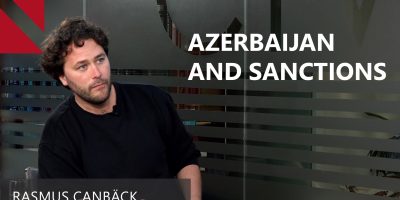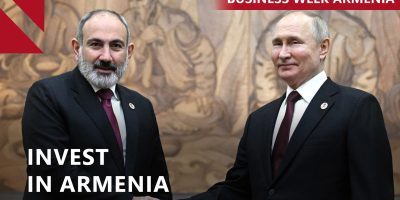 My third time visiting Karabakh came just a month after the “Four Day War” between Karabakh and Azerbaijan. The first time was with my 11th grade class from my Armenian school and the second was with a volunteer program called AYF Youth Corps where I was a counselor at a day camp for underprivileged youth. This time I was there with Birthright Armenia. This decision, to take its group of volunteers to its annual four day Artsakh trip, amidst what had taken place and all the uncertainty of the situation at the line of contact was a bold yet powerful statement.
My third time visiting Karabakh came just a month after the “Four Day War” between Karabakh and Azerbaijan. The first time was with my 11th grade class from my Armenian school and the second was with a volunteer program called AYF Youth Corps where I was a counselor at a day camp for underprivileged youth. This time I was there with Birthright Armenia. This decision, to take its group of volunteers to its annual four day Artsakh trip, amidst what had taken place and all the uncertainty of the situation at the line of contact was a bold yet powerful statement.
My first two experiences were in the summer. Now, my third time was during a very significant date, May 9th. May 9 is known as a day of three victories for the Armenian people. May 9 marks the day the Allies were victorious in the Second World War, the establishment of the Artsakh Defense Army, and ultimately the Liberation of Shushi. Simply visiting Artsakh was already something I had looked forward too, but the fact that I was going to be present for this momentous holiday build up my excitement for the trip even greatly.
In this piece, I don’t intend to just summarize my trip. We obviously visited sites in Artsakh that everyone that visits Artsakh sees like the “We are our mountains” monument, Kandzasar, Ghazanchetsots, and Jdrdzuz. I want to share the essential moments and key places that I got to visit that only contributed to my indescribable impression of Artsakh and its people.
We stayed in Shushi over the course of the three days with a host family. One of our first stops was at the Shushi Historical Museum. This museum alone was more than enough evidence to prove the historical presence of Armenians in Karabakh. The section about the Liberation of Shushi covered the weapons used, the strategies improvised, and provided extensive coverage of the key figures. It was a remarkable exhibit and the director who presented everything to us kept stressing the lion-hearted spirit of the Karabakhsti that was even clearly seen within him.
May 9 arrived. It is a happy occasion that is usually celebrated but since 40 days had not passed the “Four Day War,” the nation was still mourning the deaths of all those who participated in the clashes. Therefore, it was celebrated different than it would be normally. The usual march took place in Shushi and Stepanakert, but the mood of the people was not the same. It was clear that these last clashes had taken a toll on the people of Artsakh. However, their spirits were even higher and even more motivated. Every family we met had a son or father that was currently serving yet they were living their lives normally with that same fierce uproaring spirit.
The next stop was a visit to the winemaking facilities of Kataro. It was not only this successful winemaker in Karabakh that caught my attention, but our journey to the facilities that was even more interesting. All 45 volunteers were on the back of a potato truck surrounded by the breathtaking mountains of Karabakh. The wineyard was near the village of Azokh. As we were on the back of this truck, all you see is this holy land. The more exposed you are to the land, the more you understand why people will hold onto it for dear life.
On May 10, we visited the restaurant owned by a Birthright Armenia Alumni from Jordan named Garo who has now repatriated to Karabakh. The name of the restaurant was Muklimandil which means spider web in the Karabakh dialect. Garo’s decision to move to Karabakh and begin a new life was truly inspiring. His goal with the name is also to connect all diasporans around the world to Karabakh. It’s one thing to move to Armenia, and it is a whole other thing to move to Stepanakert. His actions have laid a foundation in all our minds of something we never really believed was feasible. In addition, we were accompanied by NKR Prime Minister’s Press Secretary Artak Beglaryan. The question and answer session with him turned out to be very insightful. Topics about the recognition of Artsakh as well as what Artsakh specifically needs help with from the diaspora were addressed. At night, we received a lecture and updates about Karabakh from Karabakh President Spokesperson Davit Babayan. Prior to meeting him, I had heard impressive things and after meeting up, my expectations had been exceeded. Davit Babayan was very informative and provided a perspective that was not given to us before. He also answered any questions we had without hesitation.
 One of the final parts of the trip that I wanted to bring up was our visit to the military hospital in Stepanakert. This was a once in a lifetime experience and I am extremely fortunate that I got to visit although it was quite difficult. I was very hesitant at first. I thought to myself hospitals already make me uneasy so imagine how I would react if I saw wounded soldiers from the frontlines. We split up into groups and visited different sections of the hospital. With my group, we visited a room with 5 soldiers. We were all introduced to them and then introduced ourselves. Two factors stuck to me: the fact that all the soldiers were either 18 or 19 and that all of them as soon as they were healed and discharged wanted to go back to the frontlines and serve in Artsakh. I want to say I was astonished to hear that but I wasn’t. The answers they provided me and the characteristics they are instilled with is exactly what I was exposed to my first two trips and is what I expected when I came to Karabakh. It should be noted that in this difficult and troubled time, the spirit of the Artsakhsi has only become more enhanced, fueled, and intensified. By the end of this excursion with “Birthright Armenia,” I was convinced that I need to come again for an even longer time in the summer to volunteer in Artsakh, and that is exactly what I plan to do.
One of the final parts of the trip that I wanted to bring up was our visit to the military hospital in Stepanakert. This was a once in a lifetime experience and I am extremely fortunate that I got to visit although it was quite difficult. I was very hesitant at first. I thought to myself hospitals already make me uneasy so imagine how I would react if I saw wounded soldiers from the frontlines. We split up into groups and visited different sections of the hospital. With my group, we visited a room with 5 soldiers. We were all introduced to them and then introduced ourselves. Two factors stuck to me: the fact that all the soldiers were either 18 or 19 and that all of them as soon as they were healed and discharged wanted to go back to the frontlines and serve in Artsakh. I want to say I was astonished to hear that but I wasn’t. The answers they provided me and the characteristics they are instilled with is exactly what I was exposed to my first two trips and is what I expected when I came to Karabakh. It should be noted that in this difficult and troubled time, the spirit of the Artsakhsi has only become more enhanced, fueled, and intensified. By the end of this excursion with “Birthright Armenia,” I was convinced that I need to come again for an even longer time in the summer to volunteer in Artsakh, and that is exactly what I plan to do.
So thank you “Birthright Armenia.” Thank you for acting like a true courageous Artsakhsi and taking us to Karabakh during a period where the people of Artsakh needed to host us more than we needed to visit. During a period where our visit was more crucial for their morale rather than it becoming just another excursion. It might have felt a bit uneasy at first, but when you’re with your fellow compatriots from around the world, there’s no safer place to be.
Dickran Khodanian

















